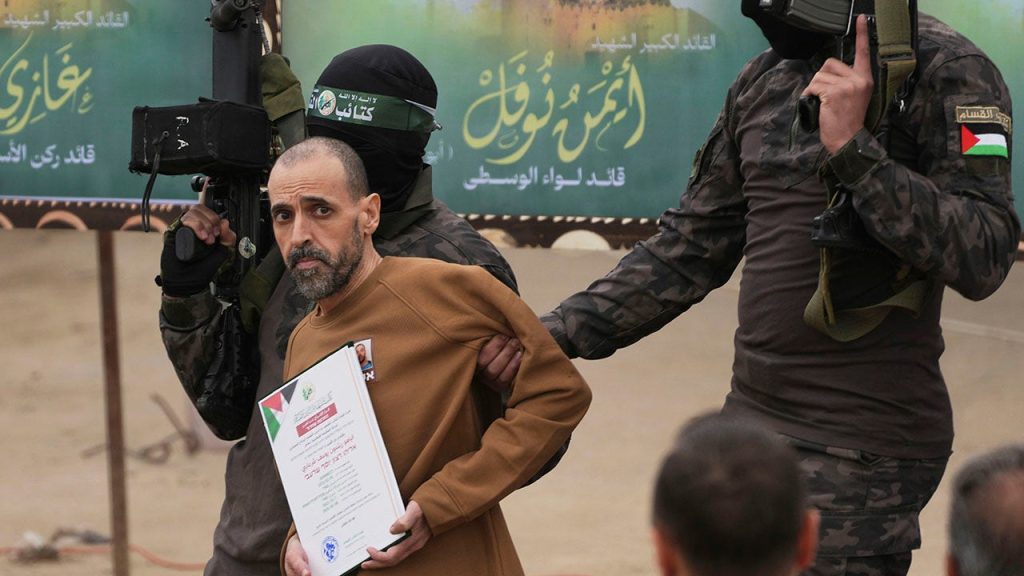A group of seven hostages previously held by Hamas is on its way to Washington, D.C., to engage with U.S. officials, aiming to express gratitude for government support in their release and to advocate for the immediate return of remaining captives. The release of these individuals follows a fragile ceasefire between Hamas and Israel, facilitating a temporary halt in hostilities. Discussions will center on the demands for Hamas to release all remaining hostages while establishing a framework for future negotiations.
| Article Subheadings |
|---|
| 1) Hostage Delegation Arrives in Washington, D.C. |
| 2) Expressing Gratitude and Urgency |
| 3) Ceasefire Developments and Implications |
| 4) Humanitarian Aid and Hostage Negotiations |
| 5) Wider Impact of the Hostage Crisis |
Hostage Delegation Arrives in Washington, D.C.
The journey of the seven released hostages, including Eli Sharabi, Doron Steinbrecher, Keith Siegel, Aviva Siegel, Naama Levy, Omer Shem Tov, and Iair Horn, marks a significant moment in the ongoing turmoil caused by the Israel-Hamas conflict. These individuals, freed from captivity amid heightened international pressures, are expected to meet with officials from the current U.S. administration, aiming to share their harrowing experiences and to support calls for the release of any remaining hostages still held by Hamas. Their arrival is part of a broader strategic maneuver to influence policymaking in the wake of the ongoing crisis.
Expressing Gratitude and Urgency
During their meetings, the released hostages intend to express heartfelt appreciation to U.S. officials, particularly noting the Trump administration’s commitment to press for their freedom. According to news sources, they will share firsthand accounts of their time in Hamas’s tunnels, shedding light on the grim realities of captivity.
“The remaining hostages, especially those who are still alive, must return home to their families urgently,”
stated Eli Sharabi, reflecting the emotional stakes of their experience. The delegation aims to stress the necessity of securing the immediate release of all remaining hostages as a priority for U.S. foreign policy in the region.
Ceasefire Developments and Implications
Recent developments have seen the Israeli government suspending the entry of goods and supplies into the Gaza Strip until Hamas agrees to a ceasefire extension. Israeli Prime Minister Benjamin Netanyahu emphasized the Israeli government’s resolve, stating,
“Our goal is to bring all the hostages home – and we will not relent for a moment.”
This suspension serves as both a punitive measure against Hamas’s decision-making and a strategy to coerce compliance regarding hostage negotiations. The White House has supported Israel’s stance, asserting that the Israeli government has been negotiating in good faith regarding hostage issues since the onset of the conflict.
Humanitarian Aid and Hostage Negotiations
Negotiations have recently seen a precedent as Israel and Hamas entered a temporary ceasefire, allowing for a limited exchange of hostages and humanitarian assistance. The first phase of the ceasefire allowed Hamas to release 25 Israeli hostages in exchange for nearly 2,000 Palestinian prisoners. Israeli forces temporarily retreated, and humanitarian aid flow was significantly increased. As discussions for extending the ceasefire continue, Israeli officials assert that not only humanitarian stipulations but the immediate retrieval of all hostages must be included as key negotiation points moving forward.
Wider Impact of the Hostage Crisis
The ramifications of the hostage crisis extend beyond the individuals directly affected, impacting broader regional stability. While Israeli officials assert that the ongoing conflict has resulted in over 48,000 Palestinian deaths, the true toll in terms of hostages and hostilities presents a complex humanitarian issue. The initial attack against Israel on October 7, 2023, which resulted in approximately 1,200 casualties, including more than 251 abductions, has intensified global calls for action regarding hostage situations and humanitarian crises in conflict zones. The current situation remains fragile as negotiations unfold, with high stakes for both the Israeli government and Hamas.
| No. | Key Points |
|---|---|
| 1 | Seven hostages freed from Hamas are visiting Washington, D.C. to meet with U.S. officials. |
| 2 | The delegation aims to express gratitude for U.S. efforts that led to their release and advocate for the return of remaining hostages. |
| 3 | Israel halts Gaza aid shipments until Hamas agrees to a ceasefire extension. |
| 4 | The ceasefire has resulted in the temporary release of hostages and increased humanitarian assistance. |
| 5 | The ongoing hostage crisis reflects a complex humanitarian issue with significant regional implications. |
Summary
The gathering of hostages arriving in Washington, D.C. serves a dual purpose of expressing gratitude for support in their release and advocating for further actions regarding remaining captives still held by Hamas. The complexities of the ongoing conflict underscore the humanitarian challenges faced by both Israelis and Palestinians, while also emphasizing the urgent need for effective diplomatic engagement. As the situation unfolds, the outcome of these discussions could significantly impact future policies and actions pertaining to the region.
Frequently Asked Questions
Question: Who are the released hostages meeting with in Washington, D.C.?
The released hostages are scheduled to meet with officials from the U.S. administration to share their experiences and discuss the ongoing hostage situation.
Question: What has been the outcome of the recent ceasefire between Israel and Hamas?
The ceasefire has allowed for the release of some hostages and a temporary increase in humanitarian aid reaching Gaza. However, negotiations for an extended ceasefire are ongoing.
Question: What major demands are the released hostages advocating for during their meetings?
The released hostages are advocating for the immediate return of all remaining hostages and emphasizing the urgency of the humanitarian situation within Gaza.



